THE RELIGIONS OF THE WORLD AT THE RISE OF. CHRISTIANITY-THEIR ANTAGONISMS AND COMMON GROUND WITH THE NEW FAITH-GREECE AND ITS PHILOSOPHIES-THE JEWS-THE INFLUENCE OF THE MESSIANIC IDEA-THE EASTERN RELIGIONS-ROME.
THE MORAL SOILS OF THE VARIOUS COUNTRIES on which the first seed of Christianity fell differed materially in their state of preparation for its reception. The Gentile soil was more favourable than that of the Jew. The reason is obvious. Christianity is the divine idea of one mind, Jesus Christ. It existed in the Old Testament only as the ore in the mine. No Jewish interpreter of the ancient Scriptures deciphered them in the same sense as Jesus of Nazareth. His explication and application were declared subversive of Moses and the Prophets, and rejected with intense bitterness. The Law of Moses not only failed to bring the Hebrew race to Christ, but rabbis and laity took their stand upon it as the eternal covenant, the whole language and spirit of which disproved the exposition of the Nazarene. It is also obvious that if the Christian solution of the Mosaic revelation be unsound, such revelation is incapable of any consistent solution whatever. But this fact, now witnessed by history and chronology, was yet to be ascertained in the Messianic century.
Deeper proof of the sincerity of their faith in their own Messianic idea the Jews could not give than by rising upon it against the weight of the whole Gentile empire of Rome. As a nation they were destroyed, but the false idea which destroyed them remains indestructible. It still moulds the mind of the Dispersion. Practically, therefore, the Mosaic Law cannot be regarded as a successful preparation for the Gospel. Our Saviour’s first ministerial act, in His Sermon on the Mount, was to repeal its most striking enactments, and to abolish its spirit of exclusiveness and sanguinary retaliation. Nothing in the Mosaic covenant not expressly re-imposed in the New Testament binds the Christian. The almost total rejection of His religion by the Jews, and its acceptance by the Gentiles, was repeatedly pre-signified by our Lord, especially in the remarkable parable of the lord of the vineyard and the husbandmen.
